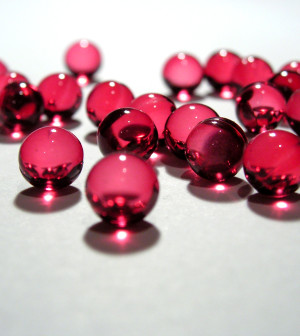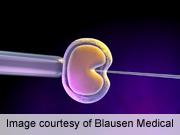- Could Your Grocery Store Meat Be Causing Recurring UTIs?
- Are You Making This Expensive Thermostat Error This Winter?
- Recognizing the Signs of Hypothyroidism
- 10 Strategies to Overcome Insomnia
- Could Artificial Sweeteners Be Aging the Brain Faster?
- Techniques for Soothing Your Nervous System
- Does the Water in Your House Smell Funny? Here’s Why
- Can a Daily Dose of Apple Cider Vinegar Actually Aid Weight Loss?
- 6 Health Beverages That Can Actually Spike Your Blood Sugar
- Treatment Options for Social Anxiety Disorder
Women’s Vitamin D Levels May Play Role in IVF Success


Vitamin D deficiency may lower a woman’s chances of getting pregnant through in vitro fertilization (IVF), a small study suggests.
Researchers in Italy compared the success of IVF in 154 women with vitamin D deficiency against that of 181 women with sufficient levels of vitamin D.
Those with sufficient vitamin D levels were twice as likely to get pregnant as those with vitamin D deficiency, the team reported Aug. 14 in the Journal of Clinical Endocrinology & Metabolism
Women with sufficient levels of vitamin D were also more likely to have better-quality embryos and had a greater likelihood of an embryo implanting in the uterus, the study found.
According to the study authors, vitamin D levels of 20 to 30 nanograms per milliliter in their blood are considered sufficient or healthy, so the vitamin D-deficient women fell below that threshold.
The study does not prove cause-and-effect, and study co-author Alessio Paffoni stressed in a journal news release that “randomized clinical trials are needed to confirm the findings.”
However, Paffoni, of the Ospedale Maggiore Policlinico in Milan, believes that the findings “certainly suggest that low levels of vitamin D contribute to infertility.”
He added that, “since vitamin D supplementation is an inexpensive and simple intervention with few relevant side effects, additional study in this area has the potential to markedly influence the way infertility is treated.”
Prior research has shown that vitamin D affects fertility in many mammals, the team pointed out.
More than 1 percent of infants born in the United States are conceived through IVF and other types of assisted reproductive technology, according to the U.S. Centers for Disease Control and Prevention.
Vitamin D is nicknamed the sunshine vitamin because the body produces vitamin D when exposed to sunlight. People also get vitamin D through foods like eggs, milk, yogurt, tuna, salmon, cereal and orange juice.
More information
The U.S. National Library of Medicine has more about vitamin D.
Source: HealthDay
Copyright © 2026 HealthDay. All rights reserved.










